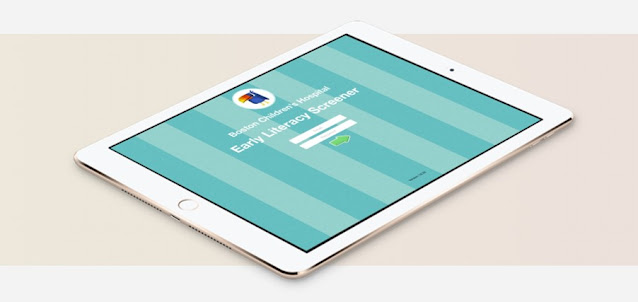Image credit: EarlyBird Education
The game that can spot preschoolers at risk for reading
deficits
EarlyBird Education is a startup company that has developed a game-based app
aimed at detecting early literacy challenges, such as dyslexia in children as
young as four years old and pointing educators to the right interventions, thus
shifting a deficit model to a preventive support model.
 The company created a 20-minute tablet-based
game to assess children’s literacy levels as they play. Additionally, the
tablet provides screening process, dashboard and analytics, customized
resources, and evidence-based tools to help translate information to teachers,
parents, and pediatricians so that they can implement a customized course of
action.
The company created a 20-minute tablet-based
game to assess children’s literacy levels as they play. Additionally, the
tablet provides screening process, dashboard and analytics, customized
resources, and evidence-based tools to help translate information to teachers,
parents, and pediatricians so that they can implement a customized course of
action.In a Business
Wire press release, the company announced last week it raised $1.5 million in
seed funding. Amplify Capital, Flare Capital Partners, and the Massachusetts
Institute of Technology (MIT) Solve Innovation Future are all investors in this
round. The current round of funding follows a successful round that raised $1.0
million to support the development of the screening assessment platform at Boston Children’s Hospital, and a
two-year validation study. This included philanthropic funding from the
Heckscher Foundation for Children, Oak Foundation, Poses Family Foundation,
Peter and Elizabeth C. Tower Foundation, and Emily Hall Tremaine Foundation.
Developed and scientifically validated at Boston Children’s Hospital in partnership with faculty at the Florida Center for Reading Research, EarlyBird helps educators identify and support children at risk for dyslexia and other reading difficulties — even before they learn to read. It does this through a cloud-based technology platform that incorporates a comprehensive screening assessment, customized action plans, and evidence-based intervention resources for teachers.
Image credit: Boston Children’s Hospital
Children can administer the assessment themselves,
and teachers get resources on how to respond if students are missing key
literacy milestones. A child using the app will be guided through different
assessments by their friendly toucan friend, Pip. The assessments are designed
to test literacy milestones which are shown to be predictive of future reading
success.
“Despite an
intense focus on reading for decades in U.S. schools, identification and
intervention for struggling readers often comes too late, resulting in negative
academic, social-emotional, and societal impacts,” said Carla Small, co-founder
and CEO of EarlyBird Education. “Our funding partners come from the
worlds of education, health, and technology, and are keenly interested in
transforming the way educators, parents, and physicians identify and support
children at risk for reading difficulties.”
The EarlyBird Solution
Story - Moving From A Deficit Model To A Preventive Support Model
When Massachusetts passed a law in 2018 requiring school districts to screen for dyslexia, Dr. Nadine Gaab, an associate professor of pediatrics at the Boston Children’s Hospital and the Harvard Medical School, was glad the state was taking a proactive approach to prevent early reading difficulties.
But in the
professional development sessions she provides for teachers in the area they
told her they weren’t trained to screen and if a screening showed that a
kindergartner did have signs of the learning disorder, they didn’t always know
what to do next.
That’s why she
wanted to provide educators with a screening tool children can administer
themselves, and one that provides strategies to help children when they miss
key early literacy milestones in areas such as vocabulary, oral listening
comprehension and phonological awareness.
The Boston
Children’s Hospital Early Literacy Screener was born as a 15 to 20-minute game
that tests children’s early literacy skills and generates a red flag for those
in need of extra support. Piloted in 42 schools in nine states and enrolling about
800 kindergarteners or entering kindergarteners, the game was also selected
as one of eight winners by the 2019 MIT
Solve for Early Childhood Development Program, a competition for tech
entrepreneurs held by the Massachusetts Institute of Technology.
Image credit: The Boston Children’s Hospital Early Literacy
Screener App
The game is
administered on a touchscreen tablet. Kids as young as 4-years-old do tasks
geared at assessing their literacy skills with the help of on-screen cartoon
animals. Those include touching the picture that matches the word that is said
out loud, identifying rhyming words, and finding the picture that matches a
spoken sentence. After a student finishes the game, the program creates a risk
profile for that student and provides resources for next steps on an online
platform.
The funding
will be used to support the commercial launch of EarlyBird in fall 2021, and
continued product enhancement.


